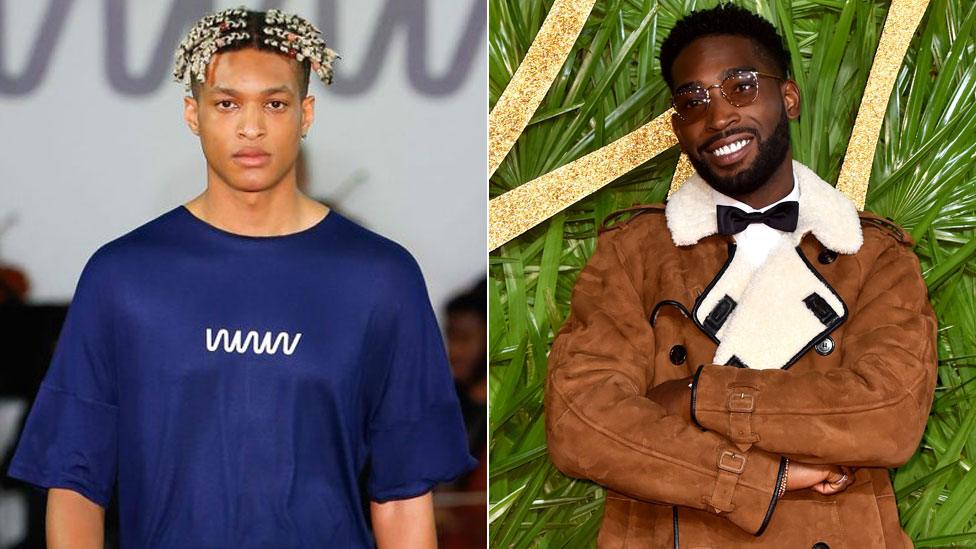New York Fashion Week: How Philipp Plein became the industry's bad boy
- Published
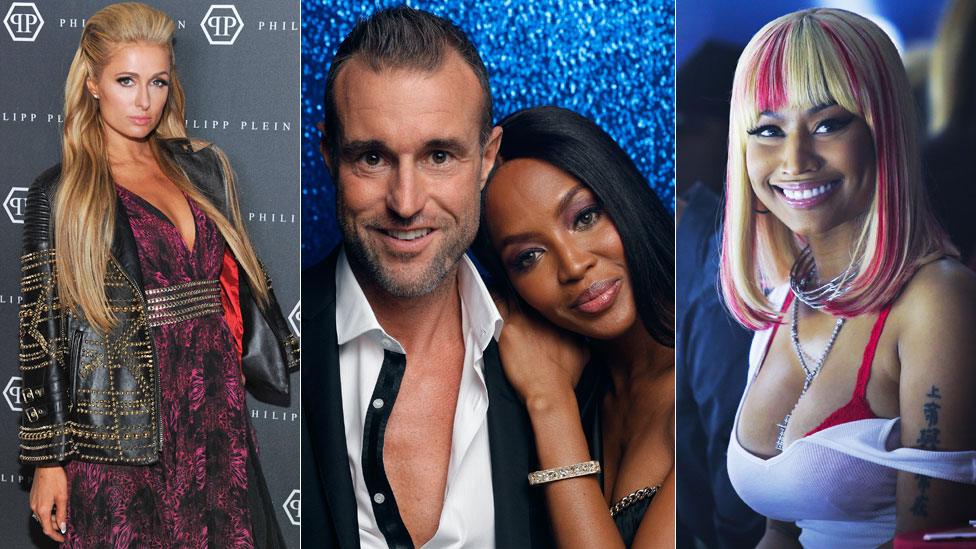
Plein fans include Paris Hilton, Naomi Campbell and Nicki Minaj (pictured at one of his shows)
In the first few minutes of speaking to Philipp Plein, the designer has likened catwalk shows to funerals and described fashion magazine editors as "dinosaurs".
It's clear from the outset that an interview with one of the industry's most exciting talents isn't going to be business as usual.
But you wouldn't expect anything less from the 39-year-old, whose clothes (and controversies) have caught the attention of Naomi Campbell, Rita Ora and Floyd Mayweather.
Plein is noticeably candid when discussing the strange politics and quirks of the industry ahead of his New York Fashion Week show on Saturday evening.
"In fashion, we're all playing with the same weapons," he tells BBC News.
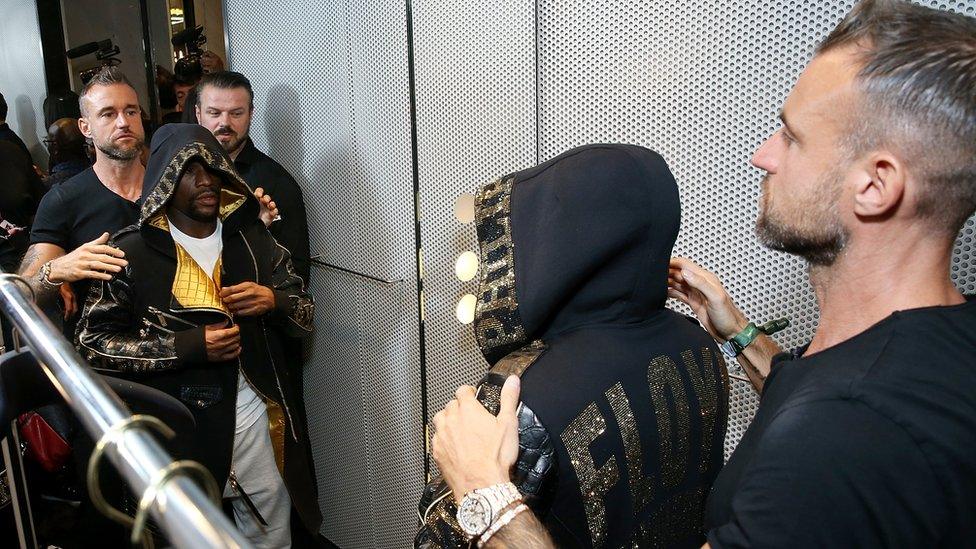
Plein dressed Floyd Mayweather for his fight against Conor McGregor last year
"If you compare two big brands, say Gucci and Prada, you will not find one article that is available at one that isn't available at the other.
"They all sell the same type of products, for the same price. Their stores are on the same street, sometimes designed by the same architects. They advertise in the same magazines, using the same models.
"Some of them even use the same suppliers. My supplier for shoes are also producing Tom Ford, Chanel, Saint Laurent and Valentino."
'You buy an emotion, a name'
Which raises the question of what the difference between high-end products actually is, and where Plein's own brand fits in.
"The difference is brand positioning and imaging," he replies. "People in the luxury fashion industry buy brands, and when you buy a brand you buy a dream, an emotion, a name."
The German-born designer has spent 14 years building up his - which started out making furniture before expanding into fashion.
He started small, with minimal investment, but once he ventured into the world of clothes and catwalks, his star rose rapidly.
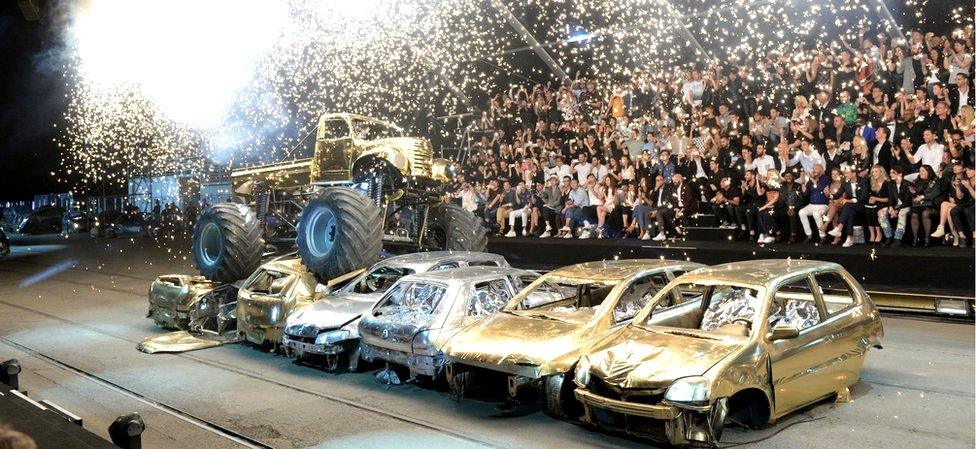
Plein's spring/summer 2016 show casually featured some gold and silver cars being crushed
Plein has since become known for his innovative designs - which are playful, daring, colourful... and often jewel-encrusted.
And the decadence, flamboyance and sheer ambition of his catwalk shows have become as much a part of his trademark as the clothes themselves.
"A fashion show is a bit like a happy funeral," he says.
"You work so hard for months on putting a show together, and then the moment you reveal the collection to the public, you've buried it, because then you have to start working on a new one."
A kind of funeral it may be - although the dodgems, chairoplanes, cars, acrobats and stunts present at an average Plein show, not to mention the thudding music and celebrity guests, don't exactly set a morbid tone.

What do the critics say?
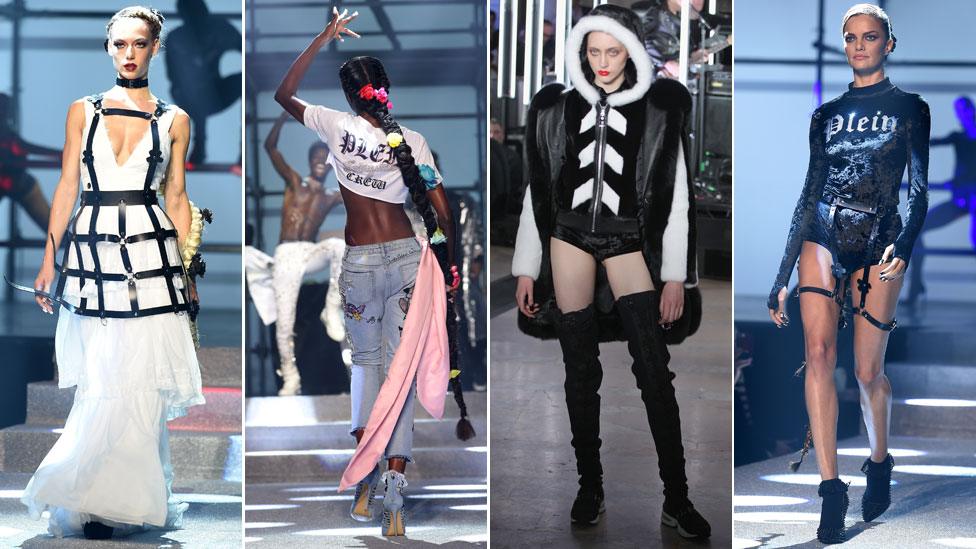
"Plein is larger than life in every way and knows that his success is based on standing out from the rest of the fashion crowd." - GQ, external
"He is essentially the embodiment of everything that the fashion establishment despises, and yet there's something compelling, possibly even magnetic, about Plein and his misfit machismo." - The Financial Times, external
"Plein genuinely goes his own way. And even though that way absolutely isn't my way - no way! - his personal blend of braggadocio and balls, plus a taste level so unabashedly trashy it's almost genius, has seen him carve out a niche it is hard not to admire." - Luke Leitch, Vogue, external

"I've never been to any fashion show by myself," he says. "I've never been invited to any. So I don't know how it really is to go to a fashion show.
"I started as an outsider to the fashion industry, and from the beginning, I didn't have any clue how to set one up. So we just did it our way."
It's telling that he feels the industry has never fully embraced him - perhaps a result of his refusal to conform. But he isn't losing sleep over it.
"I don't know any other industry that's changing so fast," he says.
"Twenty years ago, before the internet took off, fashion shows were necessary. They were the only communication to the industry to let people know about their new collections.
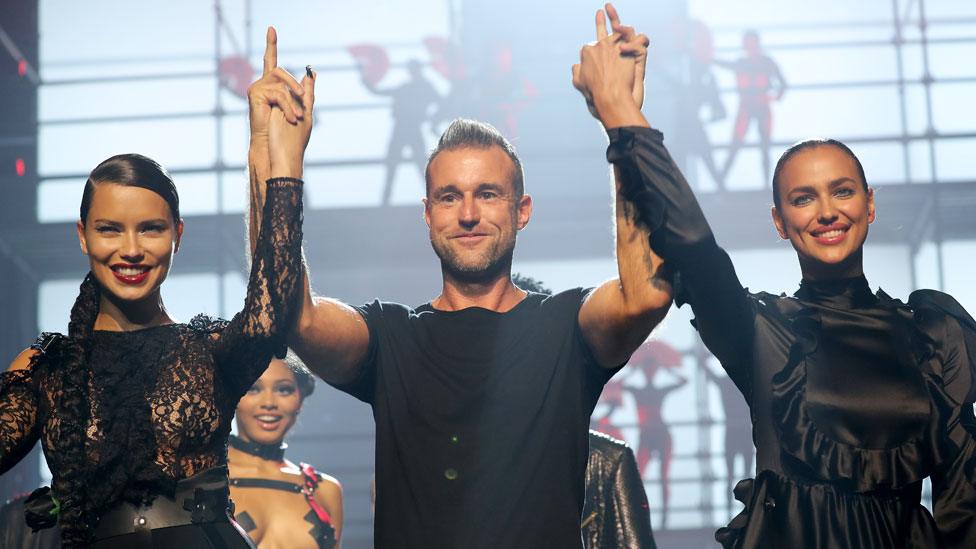
"Today, you have to ask yourself, what is more important, to have Kim Kardashian in the front row, or [US Vogue editor] Anna Wintour? It's a hard decision to make."
Warming to his theme, he then breaks down this recurring battle between traditional media and social media.
"Okay, so how many people are still reading American Vogue?" he asks. [The answer is around 1.2 million within the US, according to the most recent figures, external.]
In comparison, he says: "How many people look at Kim Kardashian's Instagram and like a picture of her? Maybe a million or more." [This is broadly correct - Kim K has 107 million followers, external and each picture she posts normally gets between one and five million likes].
"So what is more important nowadays for a brand? This is an interesting question."
It's a question he stops short of fully answering, but he isn't shy about highlighting what he sees as print's declining relevance.

We'd be totally cool with chairoplanes being hired for more events
"The few people who are still powerful in this industry are like dinosaurs. Editors like Anna Wintour, they're a dying species.
"After them I doubt that there is someone coming who is taking the place that is going to be as powerful as they have been."
With that in mind, it's perhaps surprising to hear that there are certain old fashioned traditions which Plein still champions.
In particular, his romantic view of bricks-and-mortar (as opposed to online) retail spaces.
"In the luxury sector, you still need an offline experience," he says. "Because we're selling dreams. You want to see, smell and touch the brand.
"And for many people it's still a social event to go shopping with a friend or girlfriend, to experience the luxury environment of the store. And there are product categories that are hard to sell online. If you want to buy a suit, you better go to the store and make sure they fit it perfectly."
"It's not competing with each other, it's completing each other," he adds poetically.
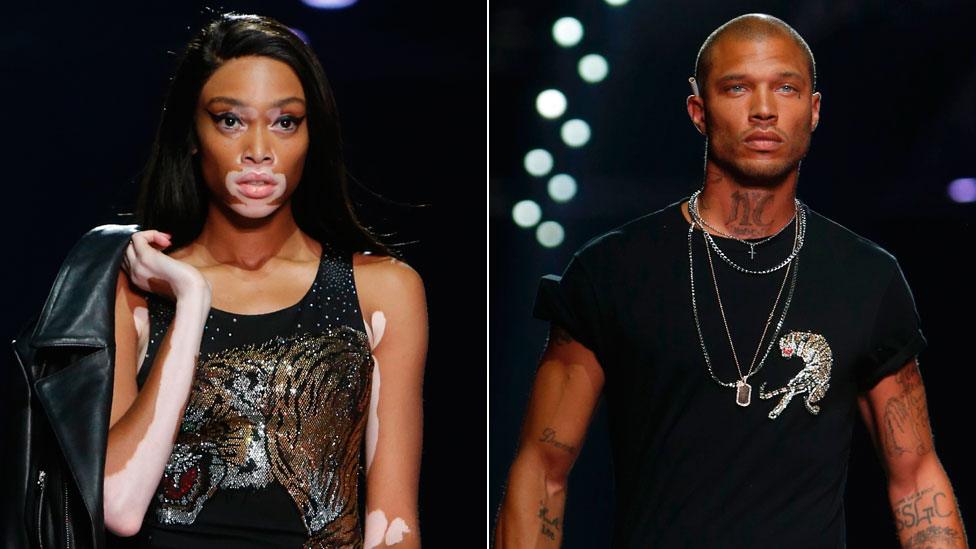
Winnie Harlow and the Jeremy Meeks (a.k.a. the 'hot convict') have modelled Plein's designs
True to form, Plein's rise hasn't been without incident.
Last month, Puma won a temporary injunction, external to stop him from selling clothes in Germany because it said there were similarities between a tiger image on one of Plein's collections and their leaping cat logo.
In response, he told German daily Bild: "I really cannot see any similarity between the jumping kitty cat of [Puma] and our Plein-Sport tiger. We have done nothing wrong."
He even offered customers discounts on his products in exchange for their used Puma trainers.
In December 2016, he responded to a legal letter from Dolce & Gabbana which accused him of poaching their staff with an Instagram post, external which read: "I want to take this moment to apologise to absolutely NOBODY!!!!"
Fashion's 'enfant terrible' also sent models down the catwalk brandishing fake guns, external in 2013 - a time when the gun control debate was raging in the US after the Sandy Hook shootings.
But despite the controversies, Plein's momentum shows no signs of slowing any time soon.
"We're continuously growing," he says. "And what I'm really proud of is we grew without help from outside.
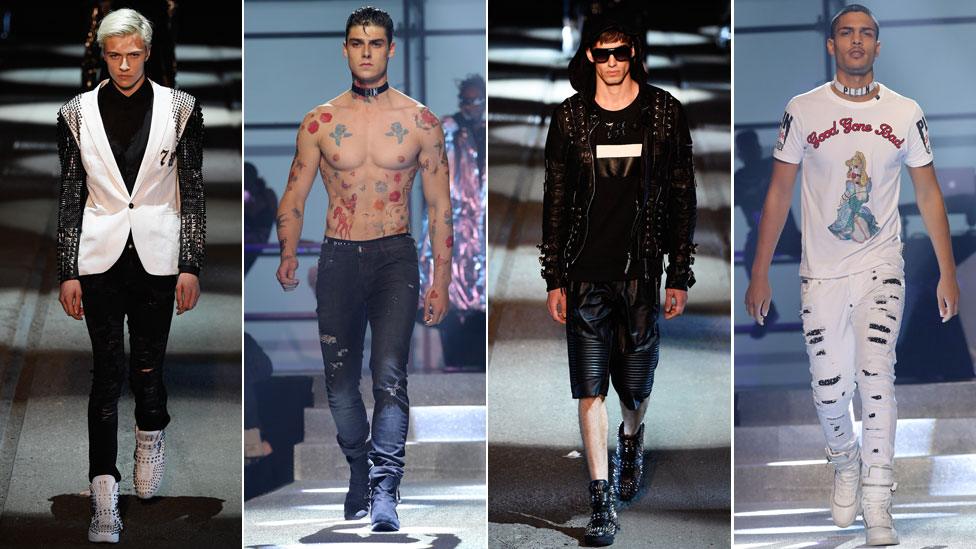
"We are an independent company, we don't have one cent from any bank in the world. Our stores, our entities, they are all self-financed by our mother company.
"It's not because I'm rich, I'm not rich, I don't have rich parents or an investor. We have developed a company out of nothing... but we're still learning and there's still a lot to do."
Of course, with several fashion week cycles every year, designers have to feed a constantly hungry beast with new ideas and innovations - but that's one thing that Plein says he doesn't find so challenging.
"Inspirations are everywhere. Some people say 'I go to India, I go here, I go there' - that's all [rubbish]," he says.
"You can have inspiration watching television at home, reading a book or playing chess.
"You could see wallpaper and say 'that's a great print for a dress'. Or you could see a painting and say wow, I like the colour combination.
"You have to be open-minded," he adds finally. It's advice which perhaps nobody needs to hear more than the fashion industry itself.
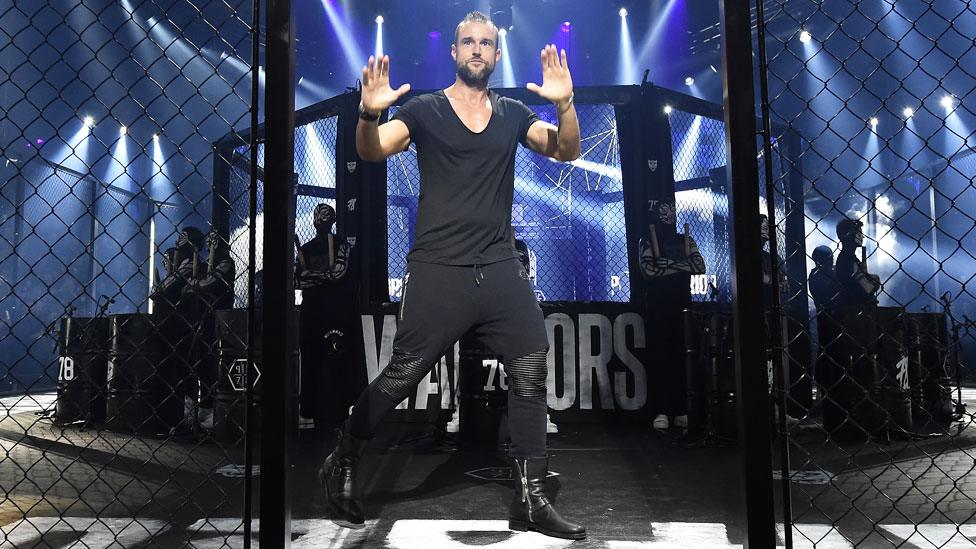
Philipp Plein's autumn/winter collection will debut at 21:00 (EST) at New York's Duggal Greenhouse in the Brooklyn Navy Yard on Saturday.

Follow us on Facebook, external, on Twitter @BBCNewsEnts, external, or on Instagram at bbcnewsents, external. If you have a story suggestion email entertainment.news@bbc.co.uk, external.
- Published4 October 2017
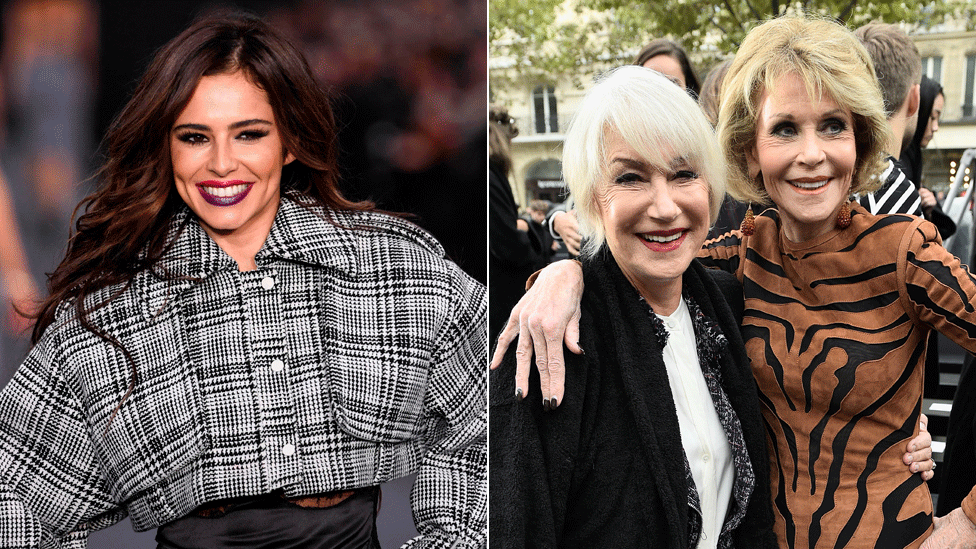
- Published16 February 2017
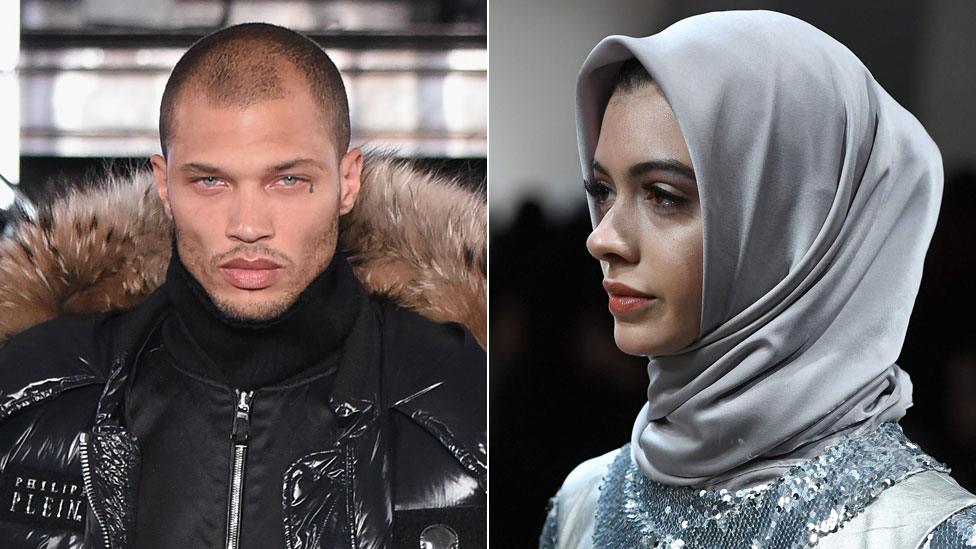
- Published8 January 2018
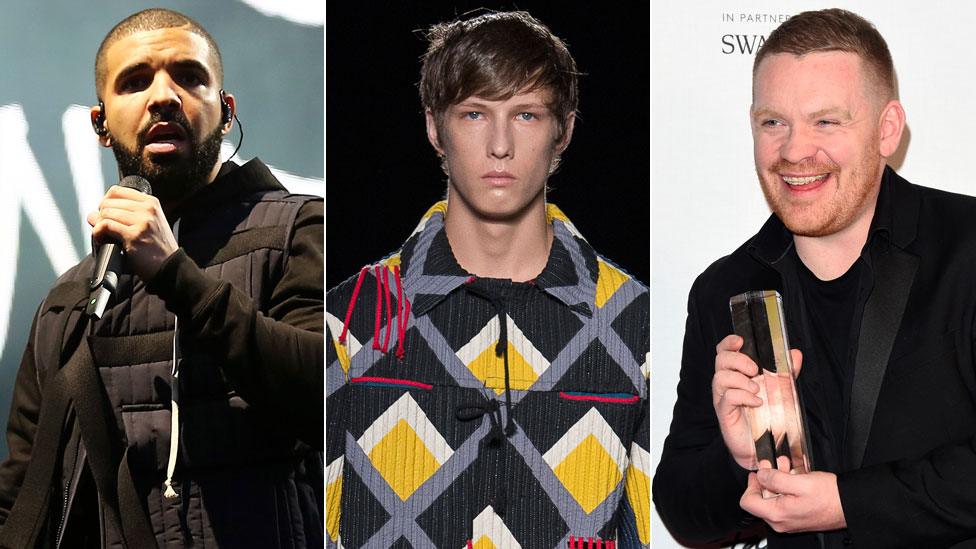
- Published6 January 2018
